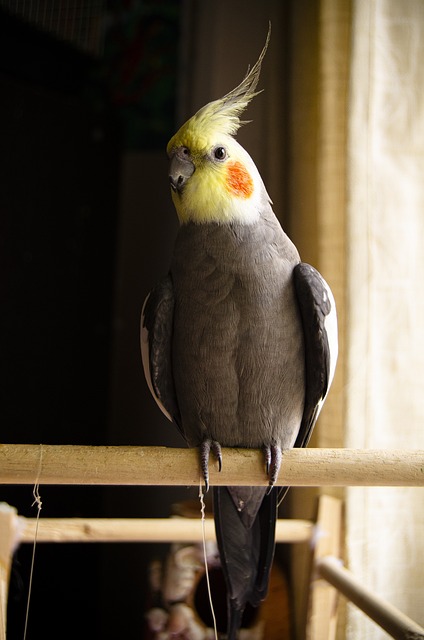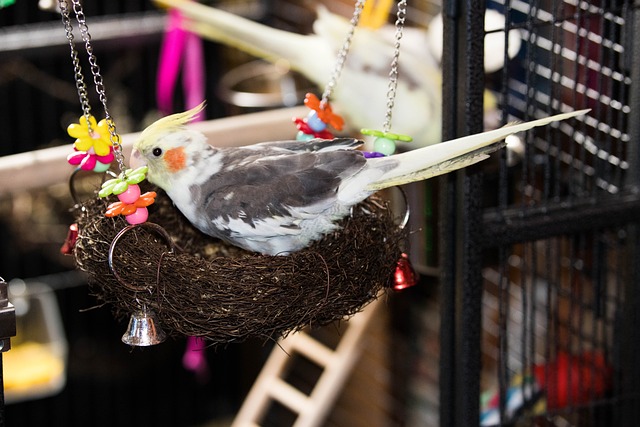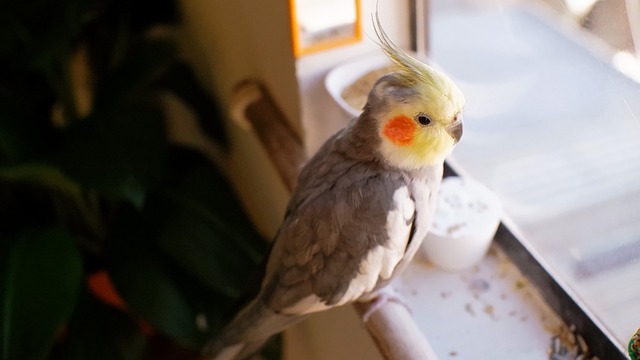Your cockatiel is a highly intelligent creature. Over recent years, research in avian cognition has determined some species to be on par with small primates. This has come as no surprise to parrot enthusiasts. We’ve known about their remarkable abilities all along.
Cockatiels are known for their friendly and affectionate nature. But they do not bond very closely with their owners when not properly trained with positive reinforcement. Cockatiels are not domesticated and they require training to be loving companions
The cockatiel is a favorite species among many parrot owners. They are small birds, about 13″ in length including their long tails, and their cages and play stands don’t overwhelm a room. As their vocalizations do not tend to penetrate walls like the larger parrot species, they are a perfect avian choice for anyone living in an apartment or condo.

Trained Cockatiels want to always be a part of the action. When the family has gathered in the living room for movie night, your cockatiel will be the first one making its way to the popcorn bowl (you will want to prepare a separate unbuttered, unsalted bowl for him). When you vacuum the house, your cockatiel will be riding a shotgun on your shoulder.
He will thoughtfully preen your hair when you are sad, and generate unlimited amounts of fun and laughter with their antics. A well-trained and socialized cockatiel will quickly become a beloved family member and you will wonder how you ever managed life without him.
Unfortunately, too many people get parrots with the expectation that they are like the family dog, who can be contended simply by sleeping at their feet. A cockatiel is a highly intelligent species that loves to explore everything in the world around them. They are in constant motion and need to be active and mentally stimulated in order to thrive.
Keeping Cockatiels Mentally Stimulated
There are two fun methods for providing your Cockatiel with enough mental stimulation to make him or her happy.
The first method that works after you have a Cockatiel who is tame, and has learned basic obedience commands like ‘Step Up’ & ‘Go Back To Cage’ is stimulating them by teaching them to perform tricks.

Trick training a Cockatiel is incredibly stimulating and if done regularly creates an expectation in your Cockatiel of excitement, where they start to crave the new puzzles and routines that they have to figure out with you each new day.
But Don’t Forget About Providing Stimulation When You Are Away!
Let’s face it, most of us have jobs we have to go to where we must leave our Cockatiel behind to fend for their own entertainment. Most people do a terrible job of doing this and end up creating serious boredom issues with their Cockatiels. The most common problem that owners of a bored Cockatiel endure is the incessant, piercing scream issued by their bird as it demands to come out of its cage or it insists that it be allowed an activity that they know is unsafe. A bored cockatiel will eventually become angry, and an angry cockatiel will bite, and make no mistake about it, that small beak can inflict a painful wound.
The Solution?
Imitate nature, by using food-finding toys to hide your Cockatiels food in, instead of its food bowls. When daily food is properly hidden in well-constructed toys, it can take your Cockatiel 2-3 hours to find breakfast while ripping apart paper toys to find just 2 morsels. This search imitates the natural job of foraging in the wild for food and is the best solution for reducing boredom and keeping your cockatiel from developing boredom-related behavior problems.
When caring for Cockatiels remember… they are sweet little balls of feathers that want nothing more than to whistle and play and ride on your shoulder…if you care for them & train them to be. Otherwise, they can be little feather devils.
The truth is, a cockatiel is no different from any other parrot when it comes to potential problems with behavior and health. They will bite and scream and can cost you a fortune in vet bills if you don’t provide the care and training that every parrot needs.
When you make the decision to bring a cockatiel into your home, you take on the complete responsibility for its health and well-being. There are many more facets to cockatiel care than might meet the eye.

Mistakes To Avoid With Cockatiel Care
Your cockatiel’s cage is its home and a place that should represent security and happiness. It should also give YOU peace of mind that your bird is safe and sound while you are away.
As most Cockatiels spend the majority of their day in the cage while you are at work, you must be sure that there is plenty of entertainment and opportunities for exercise inside. One big mistake we make with our birds is to accessorize the cage in a way that we feel will make life comfortable for them. In fact, placing toys and food dishes at a perch level promotes inactivity and makes life dull.
Try placing a favorite toy in an area of the cage that your bird doesn’t typically visit, such as the center of the top of its cage, and watch your cockatiel defy gravity to get there, and stay there, to play. This is the level of activity that wild birds encounter every day, as should your cockatiel, who will be grateful for the exercise and mental stimulation.
While many people tend to look at the cage as a place that keeps dangers out, there are many dangers that can lurk within. The cage itself can be hazardous if it is not chosen with care.
